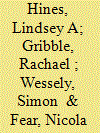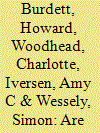|
|
|
Sort Order |
|
|
|
Items / Page
|
|
|
|
|
|
|
| Srl | Item |
| 1 |
ID:
141169


|
|
|
|
|
| Summary/Abstract |
Despite the importance of public opinion in supporting the military and their missions, little is known about how the UK public perceive their Armed Forces. This article reviews and evaluates available research and opinion poll data of public attitudes toward the UK military and situates the evidence within the civil–military gap literature. Current evidence suggests public regard for the UK Armed Forces is high despite low levels of support for the Iraq and Afghanistan missions. Public understanding of the work of the Armed Forces is limited. Nonetheless, the United Kingdom’s long history of military deployments may have given the public an “intuitive understanding” of the basic realities of the military compared with other European states. There are indications of differences in attitudes between the UK Armed Forces and wider British society, but no firm evidence that the civil–military “gap” has become a “gulf” as claimed by some military leaders.
|
|
|
|
|
|
|
|
|
|
|
|
|
|
|
|
| 2 |
ID:
124070


|
|
|
|
|
| Publication |
2013.
|
| Summary/Abstract |
Different countries have varying definitions of the word "veteran," which in turn influence the benefits that ex-Service personnel receive. However, public opinion does not necessarily reflect official definitions. This article seeks to identify whether characteristics by which UK ex-Service personnel self-identify as veterans are aligned with official policy/public opinion, and which factors are associated with self-identification as a veteran. This article utilizes data from a structured telephone interview survey of UK Armed Forces personnel. All those who had left the military by the time of interview (n = 202) were asked whether they considered themselves to be a veteran. Their responses were recorded and analyzed. Only half of the sample considered themselves to be veterans. Definitions used by UK ex-Service personnel do not align with the official UK government definition or public perceptions of "veterans," which tend to focus on older veterans and/or those who served in both World Wars.
|
|
|
|
|
|
|
|
|
|
|
|
|
|
|
|
| 3 |
ID:
072508


|
|
|
|
|
| Publication |
Amsterdam, IOS Press, 2005.
|
| Description |
viii, 243p.
|
| Standard Number |
1586035541
|
|
|
|
|
|
|
|
|
|
|
|
Copies: C:1/I:0,R:0,Q:0
Circulation
| Accession# | Call# | Current Location | Status | Policy | Location |
| 051737 | 303.625/WES 051737 | Main | On Shelf | General | |
|
|
|
|
| 4 |
ID:
129780


|
|
|
|
|
| Publication |
2014.
|
| Summary/Abstract |
Since the First World War, veterans' charities have played an important role in the provision of health and welfare services for former military personnel and their families. With the recent Iraq and Afghanistan campaigns, the number of charities for veterans in the UK has grown rapidly, leading to concerns about quality, co-ordination of services and potential competition for public recognition and voluntary financial donations. This article uses data from the 2011 British Social Attitudes survey to measure levels of familiarity with veterans' charities amongst the British public; knowledge of individual veterans' charities; and purchases of poppies for the annual Poppy Appeal. On this basis, it suggests areas where veterans' charities may wish to improve public engagement and knowledge.
|
|
|
|
|
|
|
|
|
|
|
|
|
|
|
|
| 5 |
ID:
170784


|
|
|
|
|
| Summary/Abstract |
There are currently an estimated 2.8–3.8 million people in the UK who fulfil the UK Ministry of Defence definition of a military veteran (a minimum of one day’s military service). Despite these numbers, there is little research on who the public views as a veteran and how this differs across society. Rachael Gribble, Simon Wessely, Susan Klein, David A Alexander, Christopher Dandeker and Nicola T Fear examine public conceptualisations of the term ‘veteran’ compared with definitions from the Ministry of Defence and those of ex-service personnel themselves. Factors associated with commonly endorsed definitions are identified.
|
|
|
|
|
|
|
|
|
|
|
|
|
|
|
|
|
|
|
|
|